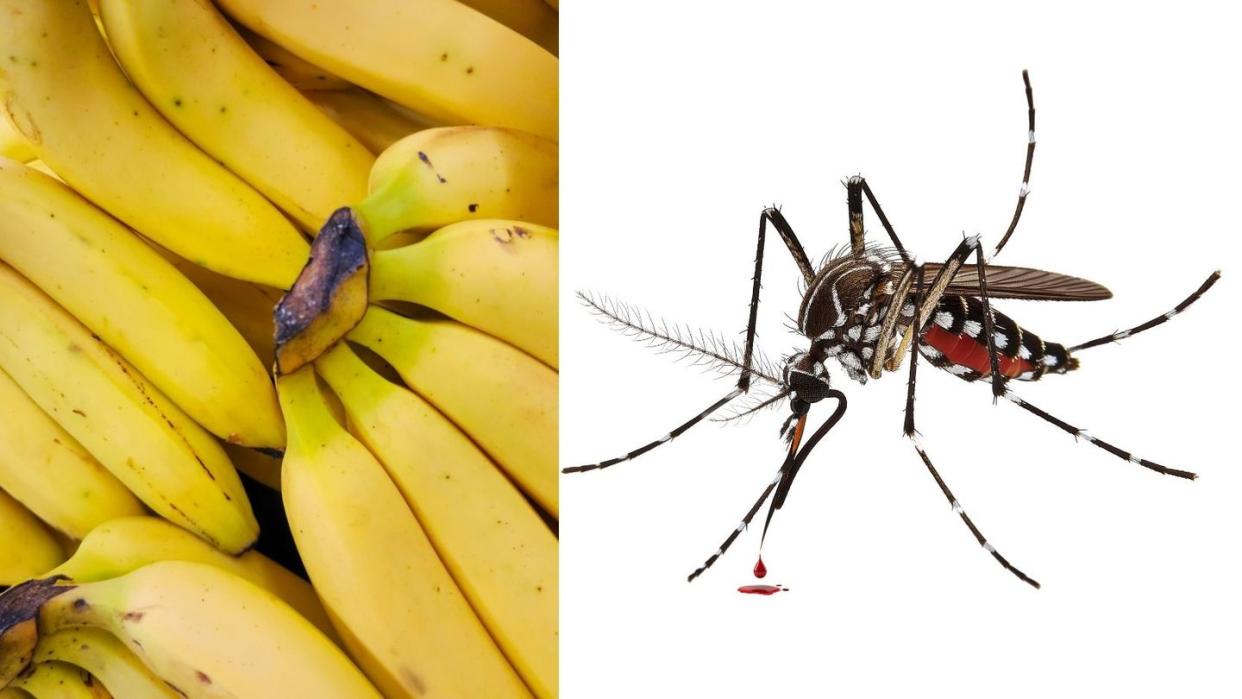Can What You Eat Really Repel Mosquitoes? Let's Debunk Some Myths

Summertime means barbecues, frozen drinks, and plenty of time at the beach. But the season also brings a major bummer: mosquitoes. Enjoy a nice dinner outside and you might end up with several itchy bites. And it always seems like some people (myself included) tend to attract way more mosquitoes than others.
Could what we eat and drink have something to do with whether mosquitoes are attracted to us? With the help of two mosquito experts, I got to the bottom of what makes mosquitoes bite people, while also dispelling a few myths about foods that attract them.
What Attracts Mosquitoes To People?
You've probably heard the myth that mosquitoes like "sweet blood." The truth is, what actually attracts mosquitoes to humans has more to do with skin and odor than our blood.
"When mosquitoes are looking to bite people, they are attracted to the carbon dioxide we exhale, but it's the smell of our skin that really focuses their attention," said Cameron Webb, associate professor and mosquito expert at NSW Health Pathology and University of Sydney.
A blend of odors creating a scent attracts mosquitoes, similar to how we "smell" other things, like a strawberry.
"There is no one odor that gives a strawberry smell, but instead 12 odors that together give the perception of a strawberry," said Christopher Potter, professor and co-director of the Neuroscience Training Program at Johns Hopkins University.
A 2022 study found that people with more carboxylic acids on their skin were more attractive to mosquitoes. In people who were studied, "the levels of these carboxylic acids remained stable in skin for a year or more, regardless of changing environmental conditions."
"With hundreds of different chemicals on our skin, some people will definitely have a cocktail of smells that is much more attractive to mosquitoes than others," said Webb.
What Food & Drink Attracts Mosquitoes?
There aren't a lot of foods that have irrefutable scientific evidence about attracting mosquitoes when eaten. And even those that do are still up for debate.
Potter said that eating bananas can make humans more attractive to mosquitoes. However, Webb writes here that it's unlikely bananas would make an impact.
While diet can change a human's odor, a 2018 study explored whether eating certain foods could change mosquitoes' attractiveness to humans. The study found that the consumption of bananas significantly increased contacts by mosquitoes, while eating grapes made no difference.
Some studies have shown alcohol to make humans more attractive to mosquitoes. Potter said that's likely due to our skin becoming warmer as we drink, and thus giving off more odors.
"Increases in body temperature could also increase attractiveness to those that have a fever, who have been exercising, or are pregnant," he said.
Are There Foods & Drinks That Repel Mosquitoes?
Perhaps you fill up on garlic-y meal before heading outdoors in hopes of warding off mosquitoes. But that extra serving of garlic bread or garlic mashed potatoes isn't going to help. (The bad breath likely won't help anyone's case either).
Consuming garlic and onion was once thought to potentially repel mosquitoes, but Potter said that has been found to not be true.
Webb added that another myth debunked by scientists is that Vitamin B repels mosquitoes.
"Unfortunately, there is no scientific evidence that anything we eat or drink will completely stop mosquitoes biting us," said Webb. "There are many urban myths surrounding foods such as garlic and bananas that are often promoted as a way to prevent mosquitoes biting but it really doesn't make a difference."
The Best Methods For Repelling Mosquitoes
To prevent mosquito bites, Webb said the most reliable thing is to cover up with light-colored, loose-fitting clothing and covered shoes. You can then cover exposed areas with insect repellent.
And of course, if you don't want to be dressed head to toe, you'll really want to rely on repellent.
"Diethyltoluamide (commonly known as DEET) is just one of those recommended by health authorities around the world as a safe, effective, and affordable way to prevent mosquito bites," said Webb.
If you're looking for more natural products, Potter recommends oil of lemon eucalyptus and lemongrass oil. He's currently working to determine which plant-based products repel mosquitoes the best.
Mosquito coils and smoldering devices also work, but Webb said they should be paired with other methods, too.
You Might Also Like
